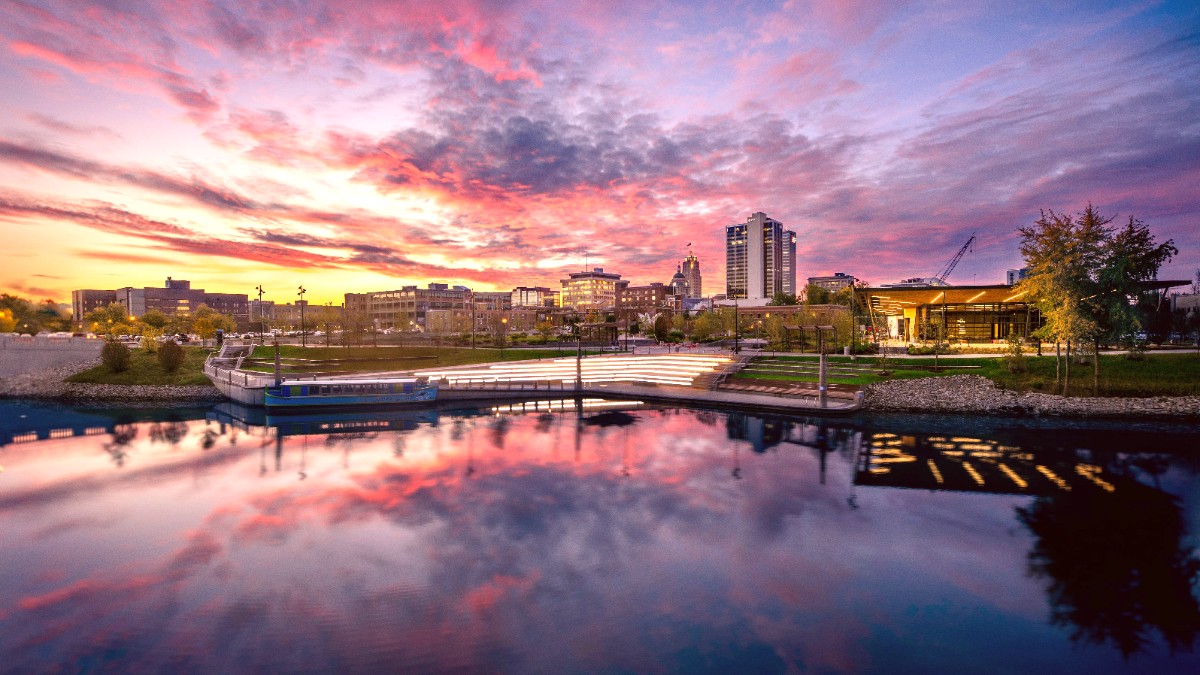
The South, USA
Spring (March-May): Temperatures range from mild to warm, generally staying between 60-80°F (15-27°C). Rainfall remains moderate, but severe thunderstorms, including tornadoes, can happen during this season. Humidity levels are moderate, making for comfortable outdoor conditions on most days. This period showcases blooming flowers in the botanical gardens and pleasant weather for walking tours.
Summer (June-August): Expect hot and humid conditions. Daily temperatures frequently exceed 90°F (32°C), and the high humidity makes it feel even hotter. Afternoon thunderstorms are common, presenting temporary relief from the heat. Outdoor activities during midday often feel challenging due to the oppressive warmth.
High Season (Spring & Fall): The weather presents the most comfortable conditions for outdoor activities and sightseeing. Many of Birmingham's popular festivals and events occur during these times, presenting a lively atmosphere. The natural beauty of the area, from spring blooms to fall foliage, adds to the appeal. Expect higher prices for accommodation and flights due to increased demand. Popular attractions and restaurants will likely experience more crowds. Booking in advance is a good idea during these periods.
June-August
Lowest accommodation prices and fewer tourists. Enjoy indoor attractions and water activities.
Intense heat and humidity. Risk of severe thunderstorms.
Late Feb/Early Mar, Late Nov/Early Dec
Mild weather, fewer crowds, potential for lower prices.
Unpredictable weather. Sudden cold snaps or early heat.
December-February
Lowest accommodation prices and fewer tourists. Cozy indoor experiences.
Can be chilly. Some outdoor attractions might have reduced hours.
Alabama is part of "Dixie Alley," a region prone to tornadoes. The main tornado season occurs in spring (March-May) and extends into late fall (November-December). Travelers should monitor local weather alerts, specifically during these months, and gather local emergency procedure information. Many public buildings, including hotels, house designated severe weather shelters.
The summer months (June-August) consistently bring high temperatures and humidity. Prepare for this by staying hydrated, wearing lightweight clothing, seeking shade, and limiting strenuous outdoor activity during the peak heat hours of the day (mid-afternoon).
Spring and Fall offer comfortable temperatures for parks, gardens, and hiking trails.
Any time of year, but spring and fall present best walking conditions for outdoor landmarks.
Plan your visit between April and September at Regions Field.
Most large festivals happen in spring and fall (e.g., Magic City Art Connection, Sidewalk Film Festival).
Frequent afternoon thunderstorms occur in summer, typically passing quickly.
Travelers to Birmingham, Alabama, must meet United States entry requirements. These rules vary depending on your nationality.
No visa for domestic travel. Carry a valid government-issued ID (e.g., driver's license). For air travel, Real ID compliant identification becomes required by May 7, 2025. A passport always suits air travel identification.
Entry into the United States for international visitors requires a valid passport and, in most cases, a visa.
No special permits are generally needed for typical tourism activities in Birmingham. Major attractions are accessible without specific permits beyond their regular admission tickets.
This section gives an overview of currency, daily expenses, and money-saving strategies.
The official currency of the United States is the United States Dollar (USD, represented by the $ symbol).
Most transactions in Birmingham are cashless, with credit and debit cards widely accepted. Visa, MasterCard, American Express, and Discover are the most common networks. ATMs are widely available throughout the city, at banks, grocery stores, and convenience stores, for withdrawing cash.
Estimated daily cost: $100-$190.
Accommodation: $60-$100 (Hostel/Motel)
Transportation: $10-20 (Bus/Limited Rideshare)
Estimated daily cost: $190-$380.
Accommodation: $100-$200 (Mid-range Hotel)
Meals: $50-90 (Sit-down Restaurants/Mix)
Estimated daily cost: $380-$730+.
Accommodation: $200-$400+ (Luxury Hotel)
Activities: $50-100+ (Premium Tours, Multiple Attractions)
| Category | Price Range | Tipping Guide |
|---|---|---|
| Accommodation (per night) | Hostels: $60-100, Mid-range Hotels: $120-200, Luxury Hotels: $200-400+ | Hotel Housekeeping: $2-$5/night, Bellhops: $1-$2/bag |
| Meals (per person/meal) | Budget: $10-15, Mid-range: $20-40, Fine Dining: $50-100+ | Restaurants: 15-20% of bill, Bars: $1-$2/drink or 15-20% of tab |
| Transportation | Bus: $1.75/ride, Rideshare: $8-25/ride, Car Rental: $40-80+/day | Taxis/Rideshares: 15-20% of fare |
This section covers various aspects, from health precautions to emergency information.
Routine vaccinations (MMR, DTaP, Polio, Flu Shot) should be current. Consult your healthcare provider a month before travel for personalized advice.
Carry in original, clearly labeled bottles. A doctor's letter explaining condition and medication is wise. Pack enough for your trip plus a few extra days.
Small quantities of cold/flu remedies, antacids, and anti-diarrheal medication address minor ailments quickly.
Heat Exhaustion/Stroke:
A concern during hot, humid summer months (June-August). Stay hydrated, wear lightweight, loose-fitting, light-colored clothing. Seek air-conditioned spaces or shade during peak heat.
Sunburn: Southern sun can be strong. Apply Broad-spectrum sunscreen SPF 30+ regularly. Wear a Wide-brimmed hat and Sunglasses. Mosquitoes/Ticks: Present in warmer months and wooded areas. Use Insect repellent with DEET or picaridin. Allergies: High pollen counts in spring/fall. Bring over-the-counter allergy medication if needed.
Tap water is safe to drink. Food hygiene standards are high in licensed establishments.
Immediate assistance for police, fire, or medical emergencies. Free call from any phone.
UAB Hospital (Level I Trauma Center, 205-934-4011) and St. Vincent's Birmingham (205-939-7111) are major facilities.
Numerous urgent care clinics (e.g., American Family Care) for non-life-threatening issues. Major pharmacy chains (CVS, Walgreens) are widely available.
Birmingham, like any major city, has areas with higher crime rates. Tourist areas generally remain safe during the day.
Alabama is part of "Dixie Alley," making it susceptible to severe thunderstorms and tornadoes, mainly in spring (March-May) and late fall (November-December).
Monitor local forecasts. Heed tornado watches (conditions favorable) or warnings (tornado sighted). Many hotels have designated safe areas.
Heavy rainfall can cause localized flash flooding. Do not drive or walk through flooded roads.
Summer months pose a risk of heat-related illnesses. Follow prevention strategies (hydration, shade).